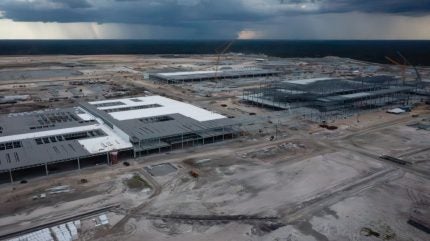
An immigration raid at a Hyundai plant in Georgia, US, last week has set off alarms among foreign businesses in the US.
Companies are seeking legal advice as they review risks for foreign staff working in the US. The incident reflects growing tension between several of US President Donald Trump’s objectives, namely increasing foreign investment in manufacturing in the US, while clamping down on illegal (and increasingly legal) immigration.

Discover B2B Marketing That Performs
Combine business intelligence and editorial excellence to reach engaged professionals across 36 leading media platforms.
The raid took place at the construction site for an electric vehicle (EV) manufacturing plant, a joint venture between Hyundai Motor Group and LG Energy Solution called HL-GA Battery Company. The Department of Homeland Security arrested nearly 500, mostly South Korean, workers.
US officials say the raid followed a months-long investigation into the immigration status of the plant’s workers. According to Hyundai and LG, most of the workers were not direct employees, with only 47 being directly employed by LG and none by Hyundai.
US Immigration and Customs Enforcement (ICE) released videos of the detainees in shackles outside the plant. The organisation said it found individuals “fraudulently using visitors’ visas”. Other experts have said that many of the workers arrested are understood to have been in the US with Business Visitor (B-1) visas and Electronic System for Travel Authorisation (ESTA) waivers. Neither of these programmes allows people to work in the US.
“It is extremely difficult to get an H-1B visa, which is needed for the battery engineers. That is why some people got B-1 visas or ESTA,” Park Tae-sung, vice-chairman of the Korea Battery Industry Association, told Reuters.

US Tariffs are shifting - will you react or anticipate?
Don’t let policy changes catch you off guard. Stay proactive with real-time data and expert analysis.
By GlobalDataH-1B visas are capped at 85,000 per year and are distributed through a lottery system. This makes it difficult for companies that need flexible workforces with specific skills to meet US deadlines to wait for approval.
Former Consul General of South Korea in Atlanta, Sangpyo Suh, told Joongang that the pace at which these visas are approved does not match established manufacturing schedules.
“As large-scale investment in the US has officially just begun, it is difficult to quickly match the actual work of workers with the purpose of their visas. It appears that this incident occurred as a result of companies that must adhere to investment schedules and ICE’s stubborn crackdown,” Sangpyo told Joongang.
LG-Energy, which had initially planned to start producing batteries for EVs later this year, has postponed the opening of the plant until the first half of 2026. Hyundai and LG-Energy had initially announced the JV in May 2023, before Trump came to power.
Other foreign electronic manufacturing companies have highlighted a skills gap in the US labour force as one of the major obstacles to expanding investment in the country.
“As with anything and everything with Trump, there is a kernel of a real issue here, but then there is the exploitation of that real issue to maximise his image,” TS Lombard chief US economist Steven Blitz told Investment Monitor.
“He did something that, on the one hand, hurts foreign investment in the US – but on the other hand, it highlights what they are trying to accomplish. They want Hyundai and other foreign countries to open plants here, but they want them to hire American workers,” he added.
“Now what is going to happen is that there will be a negotiation between the government and Hyundai, and everyone will say it was a misunderstanding, and they will move on – but we could have gotten there without the headline, but the headline feeds the political base and Trump’s need to be in the headlines,” Blitz outlined.
The incident comes as trade negotiations between the US and South Korea have stalled over details of the latter’s $350bn investment fund pledge to the US. The fund was part of the trade deal the countries reached in late July, which imposed a 15% tariff on Korean imports to the US.





